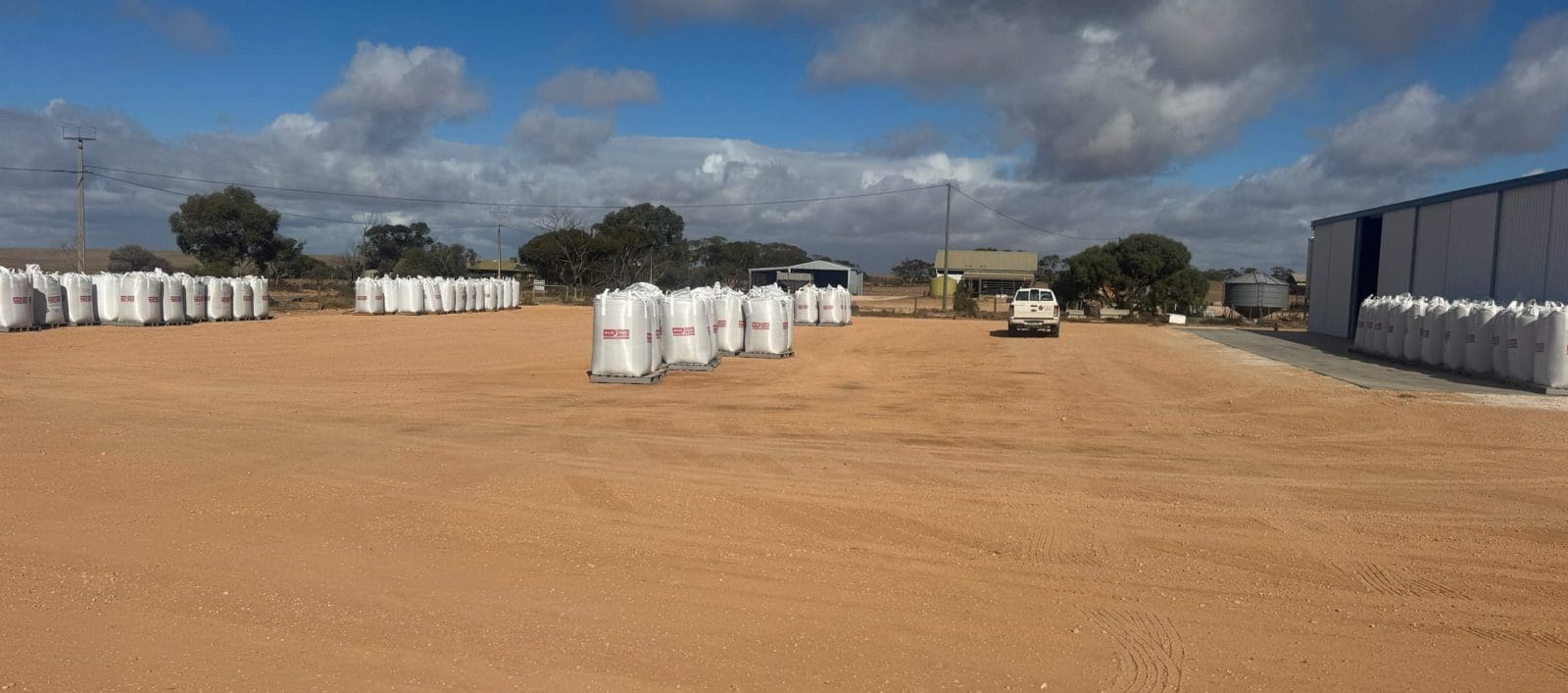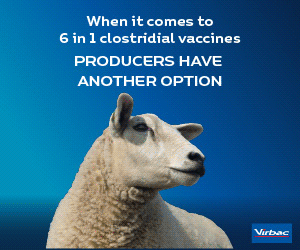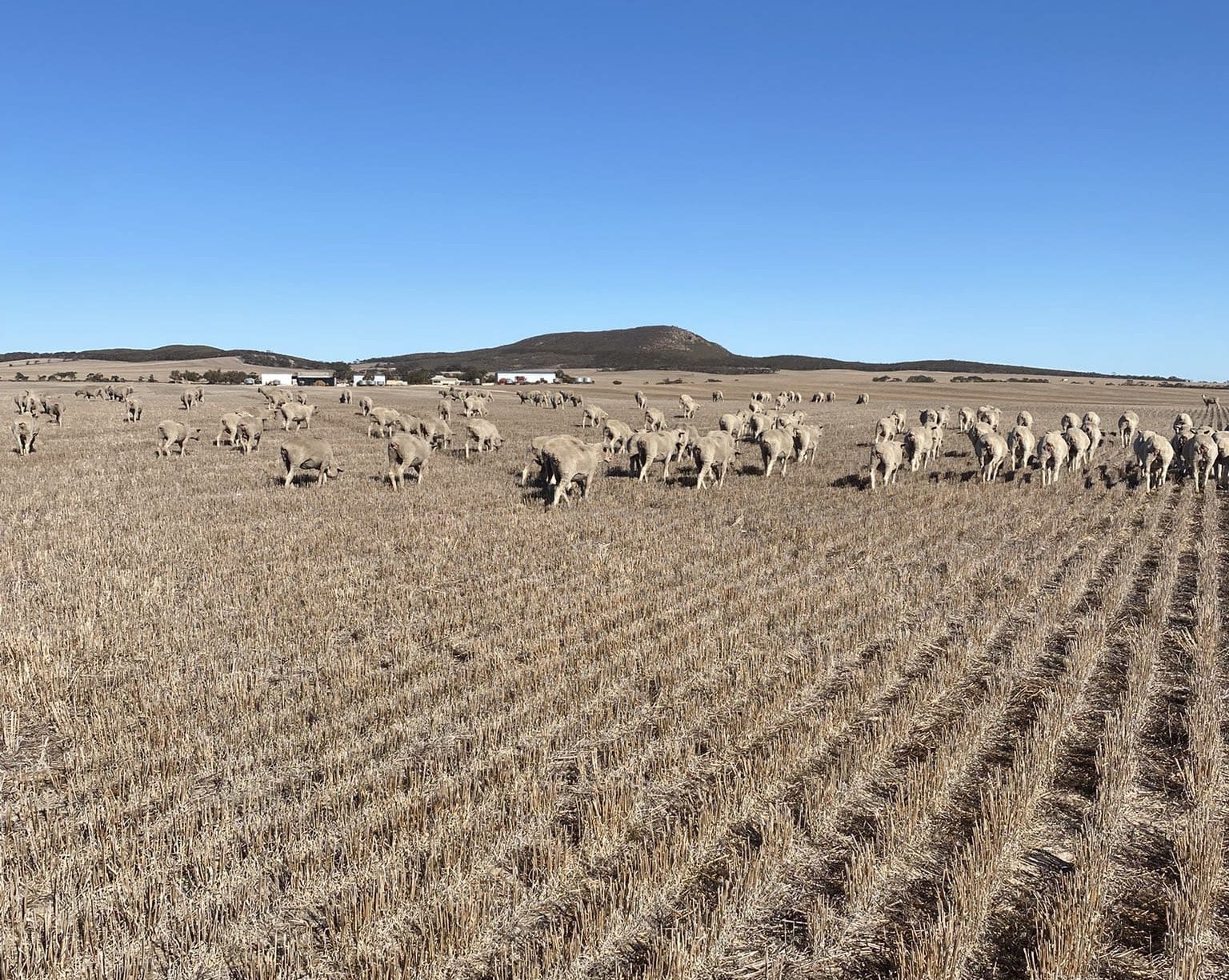
Bulka bags of sheep pellets await collection at the WCT yard in Wudinna on SA’s Upper Eyre Peninsula. Photo: Steve Whillas
SHEEP pellets made in Western Australia are making their way into South Australia to keep ewes going and finish lambs as the state battles its worst drought in living memory.
They are supplementing pellets being manufactured by SA businesses including Laucke and JT Johnson.
Grain Central understands Milne Feeds is the only WA manufacturer putting pellets into SA thus far, with both lamb and ewe pellets in demand as producers weigh up the economics of continuing to supplementary or pen feed stock.
Influencing that decision are relatively strong over-the-hooks prices of around $8/kg for lamb and $5/kg for mutton, the expense and difficulty of sourcing feed as SA’s stocks dwindle, and the cost of restocking once the drought breaks.
SA can still produce an average or better crop if the break in the season turns up as late as mid-June, but with forecasts yet to indicate a widespread rain, mixed farmers are looking at sheep and lambs as their only earner after what for many was a dismal-yielding season in 2024-25.
Pellets hit the spot
Eyre Peninsula Integrated Commodities principal Steve Whillas started bringing in pellets from WA in December to help fill the region’s feed gap after what for most was a disappointing harvest.
Mr Whillas said low yields for SA generally in 2024-25 meant a number of SA carriers went to WA to cart grain, and were looking for a backload when they returned.
“I bought the first batch when trucks came home for Christmas,” Mr Whillas said.
That was around 12 road trains, each carrying roughly 60t of pellets.
 “Since then, we’ve been bringing them in in bulka bags, and trying to find backload opportunities for trucks running to Perth from Sydney or Melbourne or wherever.”
“Since then, we’ve been bringing them in in bulka bags, and trying to find backload opportunities for trucks running to Perth from Sydney or Melbourne or wherever.”
As an agent since December for Milne Feeds pellets, Mr Whillas is selling them at around $585/t landed through WCT at Wudinna, and they are also available from a Crystal Brook site in SA’s equally drought-stricken Mid North.
“The price of lupins has gone up, and there’s no hay reaching Eyre Peninsula from fodder drops; we’re not getting enough fodder.”
Pellets are available at around $585/t landed at Wudinna, while lupins delivered EP are being offered at a new high of $740/t.
Given sheep need roughage as well in their diets, and hay is hard to find or running low on farms, pellets have shaped up as a good complete feed in western Victoria and southern NSW, as well as SA.
“I seem to be filling a bit of a need; producers are hurting out there.
“Barley’s getting bought out of the system, and there’s a little bit of grain left on farm, but not much.”
New market for Milne
Milne Feeds business development manager Brett Blanchett said autumn rain in WA’s southern mixed-farming and grazing areas has freed up some capacity for the business to put product into SA.
“Part of the state is away, and we’ve got fantastic sheep feed in the south, so our demand over here is dropping off and we are in a situation to send some east,” Mr Blanchett said.
“Because so many trucks come to WA with their forward load, we are able to take advantage…by subsiding that leg back into SA.”
Milne Feeds has been sending one-tonne bulka bags east with general freight carriers, and even in refrigerated vans that would otherwise be hauling empty out of Perth.
Mr Blanchett said expensive intrastate freight rates have helped the WA-SA freight leg stack up, with the WA-EP leg costing less than double the intrastate Mid North-EP rate, despite the far greater distance.
Mr Blanchett said demand was now switching from grower to maintenance pellets.
“A lot of lamb-finishing pellets went earlier on; now we’re seeing a shift to more ewe feeding and trail feeding, and away from lamb feedlots.”
While lamb pellets contain 16 percent protein, ewe ones are 14.5pc, and are consequently a little cheaper than finishing rations.
“With barley and oats and lupins at the prices they are, growers are getting far better bang for their buck using a pellet, though some guys will use grain because that’s what they’ve got on hand.”
Milne Feeds is expecting to truck 400t of pellets in bulka bags to SA this week to make it one of its bigger weeks to date.
Decision time looms
At Penong, Milton Chandler and family farm 45km west of Ceduna, and are getting low on fodder for their Merino ewes.
“We normally run 3000 breeding ewes; now we’re down to 1700,” Mr Chandler said.

Ahead of winter-crop sowing, ewes are moved off stubble and into pens to eat a mix of wheat, barley, field peas, and barley straw harvested on farm in the Butler Tanks district north of Tumby Bay. At 3t/ha, the pictured barley stubble was among SA’s better crops last season. Photo: Mark Eden
Numbers were reduced last spring, and the family may sell another 400 ewes off shears in June if the season hasn’t broken.
“We’ve got 70t of oats left, and only 40 rolls of hay left, so we may have to make another decision in June when we shear, and potentially offload more.
“Our last big season was ‘22 and we cut a huge amount of hay; we kept 150-180t of oats, and 300 rolls of hay, and we haven’t had a season since then to cut fodder.
“We’re heading into our third dry season now.”
Forecasts hold little hope for rain in coming weeks.
“I’ve been farming for over 40 years and I’ve never seen it like this before.”
Mr Chandler said the district relied on April rain to get winter feed going, but this April was a dry one after an extremely low-rainfall 2025, with only 125mm which produced around 90t of oats.
The Chandlers normally run livestock and crop 4000ha or more, with one third cropped, and the balance medic-based pastures.
As with every producer in SA, western Vic, and southern NSW, Mr Chandler’s fingers are crossed for a soaking rain in coming weeks to get a winter crop going, and then follow-up.
“We have absolutely no subsoil moisture, so 20mm-25mm is not going to cut the mustard.”
Grain Central: Get our free news straight to your inbox – Click here


HAVE YOUR SAY